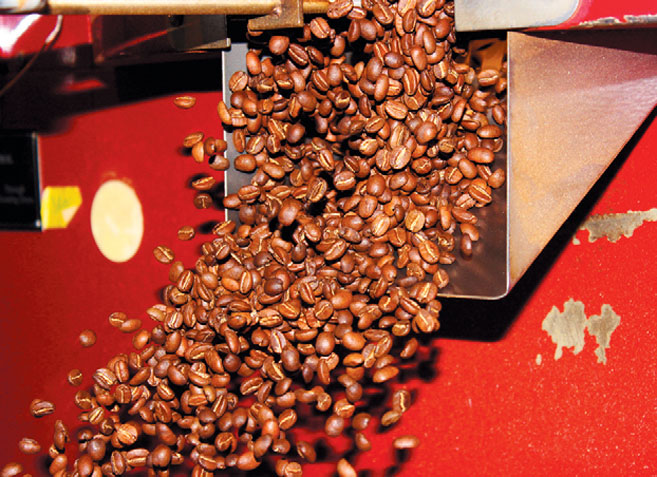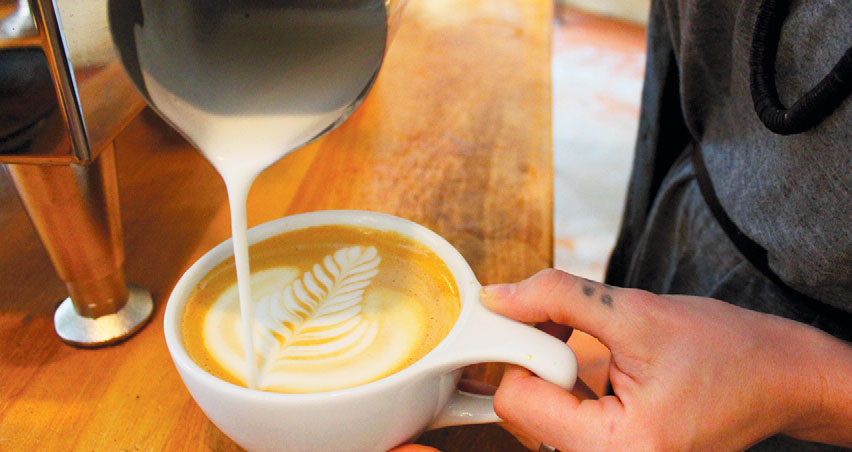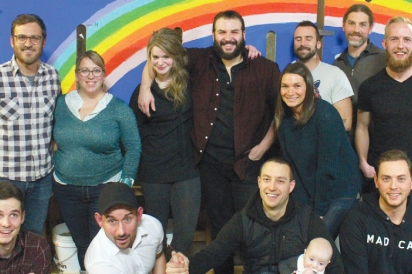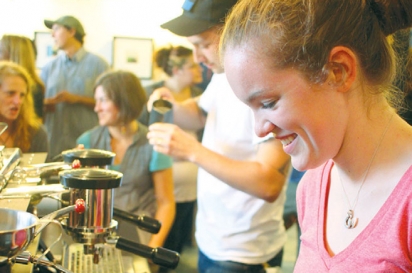Growing Traverse City’s Coffee Community
Collaboration, not just competition, is driving Traverse City’s specialty coffee scene
In a region renowned for its Rieslings, craft beers and hard ciders, many in Traverse City are hoping to make specialty coffee the next breakout beverage. Leading the growing movement to make coffee better in Northern Michigan is an increasingly cohesive group of socially engaged baristas, coffee roasters and café owners. Together, they’re turning customers on to exciting new ways of consuming the world’s second most valuable traded commodity.
“There’s been some great leadership from people that get together, brainstorm, come up with ideas and then follow through on the execution,” says Ellie Hudson, a senior staffer for the Specialty Coffee Association of America (SCAA) who now calls Traverse City home. “There is a palpable desire to collaborate.”
More and more members of the local coffee community—from Higher Grounds, Northern Michigan’s only organic coffee roaster, to Traverse City’s trendiest morning hangouts like BLK MRKT and Brew, to consumer favorites like Cavallino Café and Morsels—are banding together to spread the specialty coffee buzz.
BUT WHAT’S SO SPECIAL?
Despite coffee’s growing popularity in trendy cities like Portland, Austin or LA, few folks know what differentiates specialty coffee from, well, regular coffee.
According to the SCAA, specialty coffee “refers to the highest-quality green coffee beans roasted to their greatest flavor potential by true craftspeople and then properly brewed to well-established SCAA-developed standards.”
For local baristas, however, this highfalutin’ definition boils down to a simple truth: Specialty coffee is about customer engagement and experience.
“I love that you have the opportunity over and over to really make someone’s day,” says Jennifer Yeatts, Higher Grounds Trading Company’s director of marketing and quality assurance. “Pair that with a love of coffee, and making a really delicious beverage and valuing that as a craft, and you have the perfect recipe for specialty coffee,” Yeatts says.
As a senior barista who still takes time to serve customers in the roastery’s attached café, Yeatts connects best with her clientele when she can talk with them about the numerous finer points of her craft.
“There’s a ton of rabbit holes you can go down, and it’s really fun and satisfying when you meet customers who really are interested and want to learn more about it,” says Yeatts.
For many industry experts in the area, growing the coffee community has been a continuous process of educating customers.
“The thing that we [are] trying to get across the most [is] that coffee doesn’t always have to taste the same way,” says well-traveled Traverse City barista Spencer McQueen. “It’s taking the complexities of specialty coffee and making it accessible and easily understood.”
“People don’t look at coffee as just something you consume anymore,” continues McQueen. “It’s become an art form.”
“An art form and a destination,” adds Tony Pasquino, barista at Morsels, a local fixture known for its award-winning bite-sized baked goods.
“The thing about the diversity of the shops we have in town is that they do each have their own flair,” says Pasquino. “I think it’s cool that people are thirsty for that.” Pasquino says he’s never shy about recommending other cafés to his customers, which is an industry openness not shared by many larger coffee communities.
Though flair may factor into specialty coffee for some of the hipper baristas, café owners and customers, there remain those in Traverse City who are still just enamored with the basic elements of the drink.
“That’s what excites me the most about coffee: tasting, smelling, the new things that I find in coffee every time that I try it,” says Charles Korson, owner of BLK MRKT. Located in Traverse City’s Warehouse District, Korson’s stylistically minimalist café serves as a canvas for coffee experimentation and is the stomping grounds of many a local barista.
Regardless of how one defines specialty coffee, planting the term in the culinary lexicon of Traverse City continues to require a combined effort.
COMMUNITY THROUGH COLLABORATION AND COMPETITION
Since last summer local roasters, baristas and coffee connoisseurs of all walks have started meeting up to celebrate their craft. These open-to-all-comers (including the public) gatherings, have included latte art pouring face-offs, brewing methods showdowns and even a brief talk by a Mayan coffee farmer up from Southern Mexico. More often than not, the events have devolved from structured competitions to unfettered social events where colleagues converse freely and try out new approaches to creating appealing drinks. Unsurprisingly the mood at these events is emblematic of the changes occurring in the area’s coffee specialty community.
“When we first moved to town every individual place seemed to be insular,” says Yeatts. “These events are a way for us to connect as coffee professionals and enjoy each other’s company and learn something from one another.”
Korson, who has also worked diligently to get these events off the ground, agrees with Yeatts’ outlook on breaking down industry barriers. He acknowledges that, in the past, new roasters and cafés may have felt the need to operate in a vacuum, motivated by a desire to outperform others.
“Wanting to do your best is great. Wanting to do it at the expense of someone else’s business is not,” he says.
This new, more inclusive approach already seems to be working better.
“In the short time I’ve been here I’ve seen that the culture at those events has changed,” says Hudson, who relocated to Traverse City a little over a year ago. She indicates more and more she has seen coffee devotées leave their sideline seats and join in, regardless of skill level.
“Everybody is so supportive ... in this community now,” says McQueen, who also owns his own small roasting company, Modern Art Coffee. He identifies a collective willingness to embrace fledgling coffee start-ups as one of the things that makes the community here unique.
“It’s exciting to see a change and to be a part of it,” sums up Yeatts. “Ultimately we all just enjoy good coffee, [and] we like to geek out with other people who enjoy it.”
The events, which all involved expect to continue into the foreseeable future, are generally advertised on cafés’ social media accounts and in their shops. The next event is tentatively planned for early May.
BEYOND BORDERS
While coffee isn’t widely grown in the continental United States, some in Traverse City still feel short shrift should not be given to a crop grown elsewhere.
“Global has become local for those food products that, due to climate, cannot be sourced locally,” says Chris Treter, owner of Higher Grounds. “Not valuing those foods that cannot be grown locally, just because the farm is not ten miles from your house, is not valuing the humans who toil daily to provide you with a fine product.”
Hudson also explains that coffee, particularly specialty coffee, has one of the most convoluted supply chains in agriculture, second only perhaps to sugar cane. Unfortunately, the producers of specialty coffee, often small-scale farmers in underserved regions, are frequently left struggling.
Treter, who also founded the Traverse City–based international development organization On the Ground, says coffee consumers need to remain cognizant of the living conditions in the farming communities that produce their cherished beverage.
“I feel very strongly that our foodie culture in Traverse City should grasp that. Because it’s not only a food issue that they’re missing out on, but a social justice issue.”
For many, the first step in valuing coffee farmers is expanding the definition of community far beyond any city limits signs.
“At Higher Grounds we think about our community not just as our local community, but as our global community,” says Yeatts. She explains that the coffee farmers, who work tirelessly to bring their crop to consumers, are “just as much a part of our community as the people living next door.”
For Yeatts, Treter and others who share their values, an important part of ensuring this philosophy spreads is continuing to expand specialty coffee culture in the area.
TAKING THE NEXT STEP
While many are pleased with the progress of Traverse City’s specialty coffee scene, others recognize there is a long way to go.
“It feels like cider, craft beer and even wine are light years ahead of us,” says Hudson. She indicates, however, that the same people who appreciate a well-concocted alcoholic beverage could in time be brought around to see specialty coffee in the same light.
Korson, who also keeps on the cusp of specialty coffee, expects the shift will eventually occur in Traverse City as a natural evolution of the drink. He says at some point beer went from something you drink to “get a buzz on” to something that’s valued for its “gnarly flavors” and because “it’s got a story behind it.”
For Korson, it’s all a question of “what was that point, and what is going to do that for coffee?”
Korson’s BLK MRKT recently began serving coffee at Alliance, well-known local chef Harlan “Pete” Peterson’s new urbanely urban restaurant and bar. For forward-thinking baristas like McQueen this is already a sign of the shift. He indicates dedication to quality, craft and customer service is transcending the line between food, alcohol and specialty coffee.
“There’s definitely an industry crossover,” McQueen feels. “Coffee is just as much of a culinary experience.”
Regardless of what exciting new directions Traverse City’s coffee community takes in the coming months and years, clearly collaboration will play a central role. Collaboration and a willingness to forge ahead while confidently including customers every step of the way.
“You’ve got to push the boundaries or you’re going to fail,” says Hudson. “We’ve got a lot of room to grow.”

Know your coffee
Learn the lingo for the drink that makes your taste buds tingle, courtesy of the Specialty Coffee Association of America.
TYPES OF BREWS
Drip Brewing: The most common form of brewing. Found in most coffee shops and homes, this method uses warm water, gravity and a paper filter to extract a clear, light-bodied coffee that is free of sediment. This method does take away from coffee’s true oils and essences, which get trapped in the filter.
Pour-Over: A pour-over is a form of drip brewing that requires a cup, a (preferably cloth) filter, water heated to about 192°F to 204°F (92°C to 97°C) and freshly roasted coffee beans. In this method, hot water is manually poured into a filter filled with freshly ground beans filtered little by little until the desired amount of coffee is made.
Siphon: A vacuum coffee maker, also known as a vac pot, that uses specific amounts of heat, coffee and water to create what many believe to have the cleanliness of a filtered coffee while maintaining a crisp flavor.
French Press: A brewing method in which coffee grinds are left at the bottom of the pot and left to extract. Following thereafter, the press gets pushed down to prevent the grinds from entering the drinking cup.
GENERAL TERMS
Barista: A barista is much like a bartender or sommelier, a person who has the experience and ability to deliver coffee- and espresso-based beverages to customers at a coffeehouse, restaurant, coffee cart or other establishment.
Caffeine: A natural stimulant found in coffee. The darker the roast, the less caffeine the coffee will contain. The caffeine burns off during the roasting process.
Cappuccino: A classic blend of coffee and steamed milk named after the brown robes of the Capuchin monks.
Cupping: Cupping is a systematic method of evaluating the aroma and taste of coffee. Growers, buyers and roasters use it to analyze the quality and flavor profile of the coffee. To properly gauge the taste of the hot beverage, the judges swish and swirl a soup-spoon-sized portion evenly over their palate, then spit out the sample without swallowing. By saturating as many sensory nerves as possible, cupping participants are better able to evaluate a coffee sample.
Defects: Under SCAA standards, green coffee beans cannot have any primary defects and a maximum of five secondary defects as defined by the SCAA Defect Handbook.
Espresso: A dark, rich, full-bodied coffee made when finely ground Italian or dark-roasted coffee is processed with a special machine that forces a small amount of water at high pressure through a filter. Contact time between coffee and water is only about 25 seconds.
Organic coffee: Certified by independent agencies as organically grown, processed, stored and roasted. This means that no synthetic chemical pesticides, fertilizers, cleaners, etc. have come into contact with the coffee trees or beans.
Q Grader: At the backbone of the Q Grading System are Licensed Q Graders, professional cuppers accredited by the SCAA and Coffee Quality Institute (the charitable trust of the SCAA). These Q Graders must pass a rigorous three-day exam to earn their certification, comprising 22 sections on coffee subjects such as green grading, roast identification, coffee cupping, sensory skills and sensory triangulation. There are currently 872 licensed Q Graders worldwide. Along with providing grading services, Q Graders will support the arbitration process of the Green Coffee Association (GCA).
To learn more about specialty coffee, visit SCAA.org.







